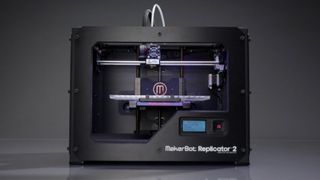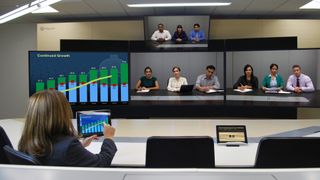How well do these new age tech jobs actually pay?
New occupations that didn't exist five years ago

Introduction

The pace at which technology is evolving means it's constantly creating new kinds of jobs. "The 'tech industry' operates within nearly every industry there is," says Julien Deslangles-Blanch, European director of the London-based digital, design and business education provider General Assembly. "Whether we're talking about the health sector, financial world or oil and gas, they all rely on the power of technology to keep them relevant in this new digital age."
Five years ago this wasn't the case – technology was seen as an add-on, an optional extra, and perhaps as a future-proof way of getting a leg-up on the competition. Now, technology is imperative to staying in business – and that means that the hunt for expertise in digital skills is on.
Some of the changes in the last five years are obvious. The Social Media Manager is now a mainstream position in many companies, while the app economy has also prompted new kinds of positions to be created.
"The birth of apps has changed the landscape of business," says Deslangles-Blanch. "We're now seeing companies invest in building apps to communicate with their audience, which has produced a significant rise in the demand for developers, UX designers, data scientists and the like."
The growth of the cloud, too, is creating new roles. "As we store more and more data in the cloud, companies are bringing in data security experts to maintain high levels of protection," he says.
In this article, we're going to discuss the hottest new tech roles, not to mention how big a wage packet they command – and we'll round it all off with a look further down the road at the future (which won't be scary and dominated by some kind of slave-driving AI boss – well, probably not, anyway).
Computer Forensics: a growing need?

Around £40,000 is the average salary for someone who can forensically assess the communications and data on storage devices, with demand set to rise because of the increasing frequency of cyber-crimes.
Are you a pro? Subscribe to our newsletter
Sign up to the TechRadar Pro newsletter to get all the top news, opinion, features and guidance your business needs to succeed!
"Computer Forensics can not only strengthen and protect the integrity of a company's systems by making them less vulnerable to wrongdoing, but they are also able to track down and identify the source of an attack," says Deslangles-Blanch.
"This makes Computer Forensics an essential part of today's corporate world, where service disruption and data theft pose a serious threat to corporations."
Data Scientist: still a 'hot' new position?

Nothing to do with androids and Star Trek whatsoever, the Data Scientist boasts an average salary of about £60,000, and they're still in demand – plus that's only going to surge in the years to come.
"With the amount of data now available and being collected by organisations, data science presents new challenges and opportunities for companies," says Deslangles-Blanch. "It's becoming easier to collect, gather, transfer and store data, but data mining, analysis and interpretation all require increasingly more technical skills and toolsets."
Demand for people who can understand data, and how patterns and trends can be used to reveal customer needs, is expanding rapidly.
Ethical Hackers: 'defence in depth'

Conducting advanced penetration tests on corporate computer systems gets you a salary of between £50,000 to £70,000. "Organisations will recruit an Ethical Hacker to identify weaknesses in their security program and aim to demonstrate similar tactics and techniques in how other attackers could steal, damage or misuse company assets," says Neil Thacker, Information Security & Strategy Officer at Websense.
"It's an evolution away from general penetration testing, where primarily these tests focus on an application or a specific scope of testing … black-box penetration testing is a similar concept to ethical hacking, whereby as the attacker you need to learn and understand the defences through a broader range of footprinting and reconnaissance techniques."
Ethical Hackers go through rigorous training and testing. To become a certified Ethical Hacker requires a regular four-hour exam, with other certifications requiring a mixture of theoretical testing and hands-on training.
3D Printing Specialists: who needs them?

'Down-fabbing' – fabricating an object using a downloaded digital design and a 3D printer – is becoming more and more popular in industry, primarily for producing small parts and prototypes.
"3D printing has been revolutionary," says Deslangles-Blanch. "It's being used for everything from making prosthetic limbs to building houses, and they're even looking into how we can create organs using this technology, which is incredible."
There are at least 30 ways of using 3D printing, and that list is growing every week. Experts on 3D Scanning for reverse engineering, and who can design and print 3D objects from scratch, should expect to earn about £40,000.
Growth Hacker: getting apps noticed

Sometimes called a Global User Acquisition Manager – and not to be confused with an Ethical Hacker – a Growth Hacker gets paid between £30,000 and £50,000 to grow the user base of an app or service.
This is often done in creative and innovative ways, and primarily for startups looking for a foothold in a market – we're talking about people with advanced digital/online marketing skills, and with an entrepreneurial bent, too.
In this context, a 'hack' is a successful way of persuading someone to download an app, and covers everything from giving away a free T-shirt to making a promo video that goes viral. A great example of a growth hack is Mailbox, which created a visual waiting list to download the app that in turn prompted a buzz about the app on social media. Millions downloaded it.
Data Security Specialist: defending data

Around £50,000 is the going rate for someone who is responsible for ensuring and maintaining the security and privacy of an organisation or individual's IT data.
We're already deep into the Industrial Internet of Things, which means businesses are creating more data than ever before – and it needs securing.
"When Sony experienced its data breach, private information was leaked and we were reading about it across the world," says Deslangles-Blanch. "Organisations are holding data on millions of people, and a data breach could be catastrophic … the Data Security Specialist plays a pivotal role in massively reducing the chances of this happening."
The future digital workforce

A study carried out on behalf of O2 said that Britain will need 750,000 skilled digital workers by 2017, and the alternative could be losses to the UK economy of £2 billion.
"Though the answer's not quite as black and white as we'd like, the rate at which technology is evolving is making it a lot more difficult for people to keep up-to-date with the skills they need, meaning demand for highly skilled individuals in the digital world is exceeding supply," says Deslangles-Blanch. "The importance of encouraging people to update their skillsets and fill these roles is something we are passionate about at General Assembly."
It's also worth noting that as occupations change to match advancements in technology, so does the workplace itself.
"Some firms are now turning to technology to assess how the workplace environment is affecting staff behaviour and outputs," says Nigel Crunden, business specialist at Office Depot, who thinks that technological advancements have had a profound effect on the way that we work. "US companies such as the Bank of America and Cubist Pharmaceuticals have experimented by using badges with infrared, Bluetooth and recording capabilities to monitor the movements of employees throughout the working day."
Those movements can then be analysed to measure how office layout and proximity to other members of staff impact upon productivity, well-being and innovation. "This data is then scrutinised to discover what factors help and hinder performance linked to the working environment, and will ultimately provide further insight into achieving greater workplace efficiency," says Crunden.
It should come as no surprise that as emerging technology helps creates both new occupations and big data, the digital workplace also exerts more and more control and analysis of all its resources – and that means its staff.
Jamie is a freelance tech, travel and space journalist based in the UK. He’s been writing regularly for Techradar since it was launched in 2008 and also writes regularly for Forbes, The Telegraph, the South China Morning Post, Sky & Telescope and the Sky At Night magazine as well as other Future titles T3, Digital Camera World, All About Space and Space.com. He also edits two of his own websites, TravGear.com and WhenIsTheNextEclipse.com that reflect his obsession with travel gear and solar eclipse travel. He is the author of A Stargazing Program For Beginners (Springer, 2015),
Most Popular



